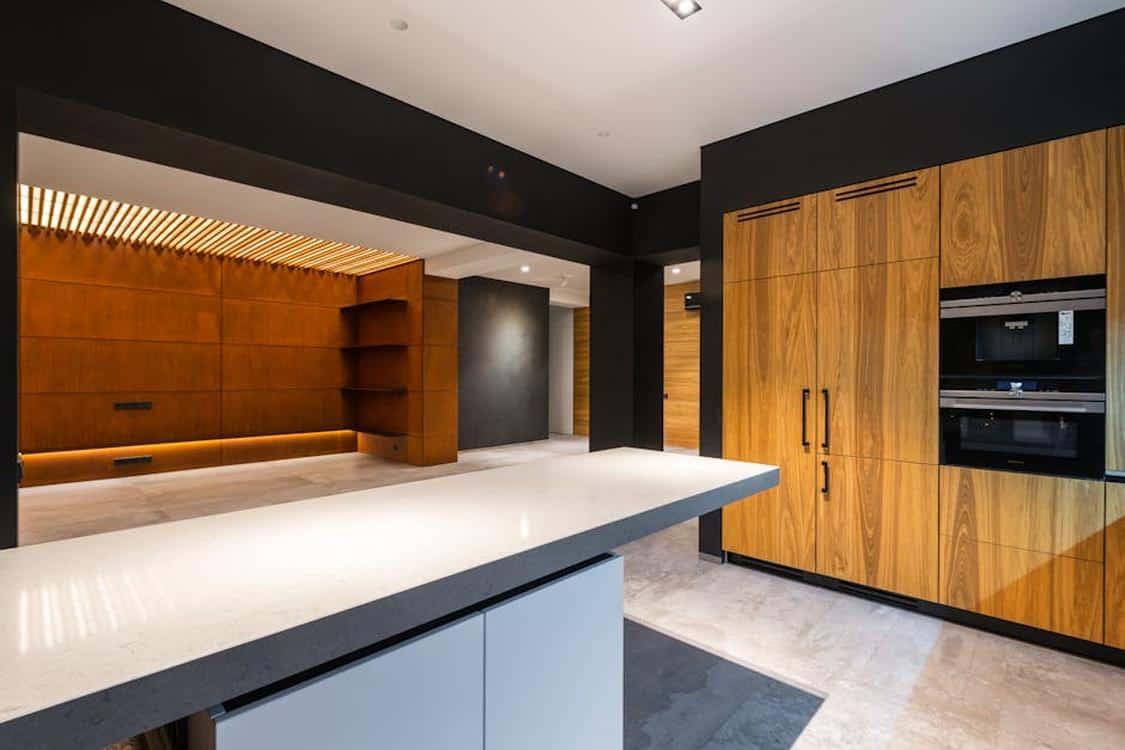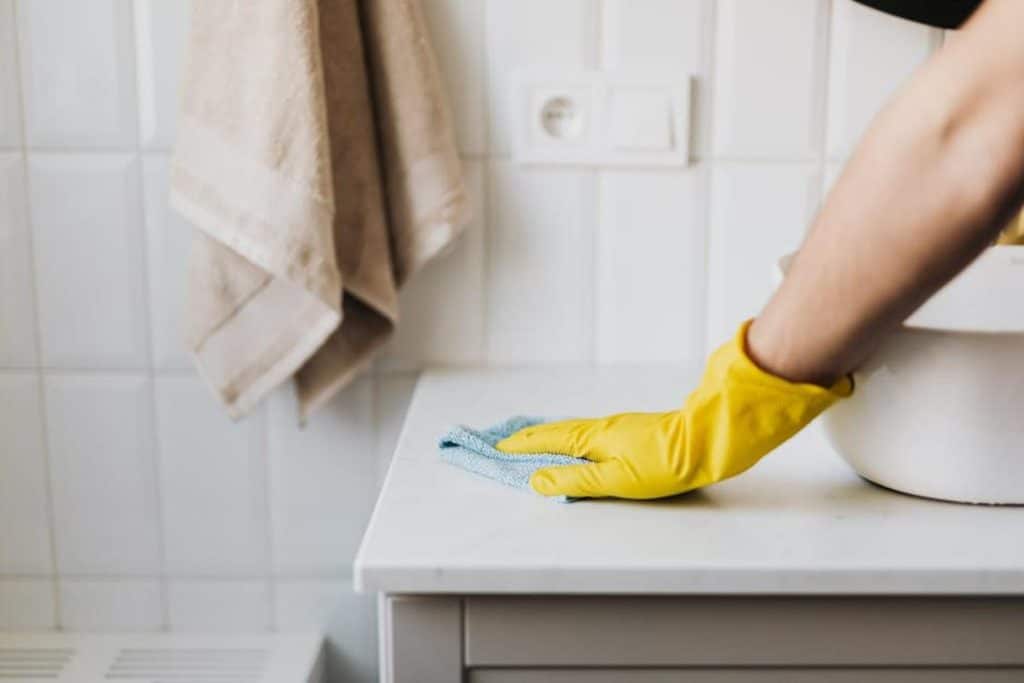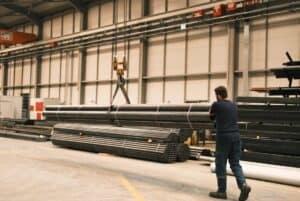High-traffic garage floors are exposed to a wide range of harsh materials and chemicals. Without adequate protection, they can suffer from significant damage over time.
Effective solutions for this challenge include durable coatings and flooring materials. Epoxy, for example, offers outstanding resistance to common garage spills and is easy to clean. Polyurea is an advanced alternative, with superior durability and flexibility.
Epoxy
Unlike floor mats and garage floor paint, epoxy flooring provides robust endurance. It stands up to heavy vehicle or equipment traffic without denting, scratching, or chipping. Epoxy is a thermosetting resin that bonds with existing surfaces to form an impermeable, solid layer. When a hardener mixes with the epoxide resin, it triggers a chemical reaction that creates cross-linked polymers. Those durable polymers make epoxy strong, durable, and long-lasting.
In addition to its durability, epoxy is resistant to spills and stains, so upgrade your garage with a durable finish. It can be washed clean of oil and gasoline without leaving marks, a benefit that makes it ideal for areas where vehicles or heavy equipment are regularly stored.
Epoxy floor coatings also offer superior resistance to abrasion. Their hard, protective surface shields against damage from sharp objects and vehicle tires. This is particularly important for garages that are used as work zones and storage rooms.
Professionally installed epoxy coatings are available in a variety of textures, colors, and thicknesses to match the unique needs of each garage space. While the epoxy is still wet, decorative color flakes can be sprinkled on top to add style and texture to your garage floor. A clear topcoat is then applied to protect the coating and keep it looking new. While epoxy can last for years, its lifespan is impacted by the quality of the installation. An experienced, highly trained installer can ensure the strongest and most durable finish possible.
Polyurea
Polyurea is a high-performance floor coating that provides superior benefits over epoxy flooring. It has a fast curing time, UV stability, chemical resistance, durability, and minimal maintenance needs.
Its non-porous surface repels stains, making it easy to clean up common garage messes like grease and oil. It also has excellent impact and abrasion resistance, which makes it ideal for garages that are subject to heavy traffic and frequent vehicle use. This means your garage floor will be protected from damage and wear for years to come.
Unlike epoxy, polyurea does not change in color when exposed to sunlight. It also offers greater flexibility, which allows it to adapt to substrate movement and environmental changes. This protects your floors from cracks and other problems caused by changes in temperature.
Another advantage of polyurea is that it can be installed on a concrete surface without having to grind it down. This saves you time and money. Our installers use a shot blasting machine to remove any dirt, debris, old paint or other contaminants from the concrete surface before applying the polyurea. It is then rolled and troweled into place, resulting in an even and attractive finish. The final result is a durable, protective floor that is ready for use within hours of installation. This quick turnaround is particularly useful for homeowners who want to use their garages as soon as possible.
Concrete Stains
Concrete dyes are a type of stain that are typically used on concrete floors. They are made from super fine pigment particles that are suspended in liquid or powder. They are applied in much the same way as a concrete stain, however, the tinting power is more intense. Because of this, they tend to produce more dramatic color effects. They are also able to be used in more aggressive applications and can be applied to floors that have already been stained.
Like floor paint products, staining a concrete garage floor offers an aesthetically pleasing way to spruce up your space. They are often chosen purely for their decorative appearance, adding color or even a natural stone look to a garage floor’s surface. Stains, which are usually available in water-based and acid types, may help to hide surface blemishes, but they do little for a floor’s durability since they barely penetrate the concrete.
Similarly, a quick fix with inexpensive tubes of sealant or filler isn’t really a long-term solution either. These types of fixes tend to chip, peel, and fade relatively quickly, meaning that you’ll be back to looking for a more durable garage floor solution sooner rather than later. The good news is that, with proper planning and slab preparation, stained concrete is a durable option for both new construction and post-pour repairs. For projects prioritizing longevity and durability, a staining treatment that incorporates concrete resurfacing materials, such as Brickform Cem-Coat, is an excellent choice.
Garage Floor Tiles
Whether your garage is used as a workshop, an office, or just for parking cars and tools, durability and abrasion resistance are key features to consider. Upgrading your garage floor to a more durable surface like polyaspartic coating, epoxy, or tiles will protect your investment and enhance the beauty of your space.
Tiles are a popular flooring option for garages because they’re easy to install, customizable, and cost-effective. These plastic, rubber, or PVC squares can be snapped together without the need for adhesives or specialized tools to create a smooth, flat floor that’s ready to use within the same day.
They’re also resistant to stains and spills, and can be arranged in a variety of patterns for a unique look. Rubber and PVC tiles are especially durable, while polypropylene ones have added shock absorbency. They’re moisture-resistant, which makes them ideal for garages that are prone to dampness or spills.
One drawback to tiles is that they can be difficult to cut, particularly around obstacles like pillars or walls. You can minimize this by leaving them in place and cutting them later, or by using a jigsaw. Either way, it’s a good idea to wear knee pads while installing tiles for comfort. And be sure to have extra tiles on hand, in case you need to pull up a single that isn’t sitting quite right. (Tip: A jigsaw will make short work of corner cuts.)
Interlocking Mats
For a quick, non-permanent garage flooring solution, mats are the way to go. Typically made from rubber or PVC, interlocking mats are hard-wearing and can be easily rearranged as needed. They are designed to withstand heavy loads and resist oil, dirt and mould while remaining flexible under pressure.
These mats are great for high-traffic areas and can be used in a wide range of spaces, from commercial gyms to workshops or even home playrooms. They are easy to clean and offer a comfortable, slip-resistant surface while offering good resistance to chemicals. They are also lightweight and can be easily relocated as needed.
Many of these mats are designed with a containment edge, which is helpful for keeping spillages and snow contained and protected from floor damage. This is especially useful during winter months. They are easy to clean, simply requiring a hose down or a little bit of soap and water.
Mats are particularly useful in a children’s playroom, where they can be used to protect hardwood floors from sticky food or drink spills and scuffs while providing a more comfortable surface for kids to stand on. They are also more affordable than epoxy coatings and can be easily replaced if they become permanently damaged or stained by paints, markers or other craft supplies.
Rubber Flooring

Rubber flooring is a versatile solution for garages, offering a durable and attractive look. It’s easy to maintain, resistant to spills and heavy loads, and provides a comfortable underfoot. However, it is susceptible to oil-related damage and should be protected with protective mats when working on vehicles or using power tools. Additionally, it can fade quickly when exposed to prolonged direct sunlight.
Rubber’s natural elasticity makes it a resilient material that can withstand repeated impacts and high foot traffic. It also offers a soft, cushioned surface that’s ideal for areas where comfort is important, such as in a home gym or workspace. In addition, it’s insulating, keeping your garage warmer in the winter and cooler in the summer.
There are several options when it comes to installing rubber flooring, including rolls that are rolled out and cut to fit, and interlocking tiles that snap together in any pattern you like. Typically, they can be installed over a concrete slab without the need for adhesives.
To get the most out of your rubber floor, sweep it regularly to remove dust and debris. Then mop it with a mild soap and water solution as needed. If you notice any stains, clean them immediately to avoid permanent damage. For a deep clean, consider hiring professionals with the right equipment to prevent premature wear and tear. This helps reduce your long-term maintenance costs while protecting the value of your home.




